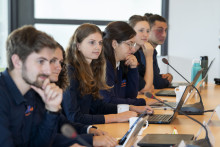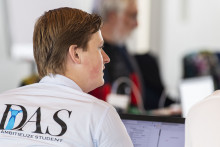The Binding Study Advice, to 30EC or not?
Kerwien Lopez: ‘It’s an interesting topic for sure and we have a clear opinion on it. In an ideal situation we wouldn’t need a BSA at all, but unfortunately our options are limited. We need to make sure everyone gets into the right study programme and learns the right topics. A binding study advice can help achieve that. With all the project-based learning here at the UT, getting rid of a BSA wouldn’t work. One or even more people slacking off would definitely be stressful for project mates. But a BSA of 30 points in the first year, as the plans of the minister are at the moment, would just postpone problems until later on in someone’s study. We would need to find a sweet spot, which fits with the course of the programmes. The BSA definitely has its negative sides, but it’s the least-bad alternative we have.’
'Someone's study progress is viewed far too quantitatively'
Kamphuis: 'I don't think our position differs much from UReka: if you only have to get 30 points in your first year and 60 your second year, you're just postponing a decision. At worst, you are taking a year away from someone's life. At the same time, there is also the well-being aspect; in your first year, you are often going to live on your own for the first time, have to take care of yourself and discover who you are. There is a lot involved in this that, as far as I am concerned, it is better to look for a middle ground. Do apply a reasonably firm BSA, but accompany it with more personal attention to someone's circumstances. The UT has numerous student advisors, but someone's study progress is viewed far too quantitatively. There should also be room to develop yourself outside your study.'
Student well-being and social safety
Kamphuis: 'Activism is incredibly important to us; it helps in your personal development to get involved in something outside the lecture halls. But it is definitely something that has come under pressure, first because of the introduction of the student loan system, among other things, and later also because of the pandemic in particular. We are still in the aftermath of this; if you are still a young student, you are still mainly used to being locked up and students have come to regard other things as more important; credits rather than development, you could say. We want to continue to put the importance of self-development on the agenda, but when it comes to these issues, we must above all be realistic. I'm not going to populistically call for us to hire tons more student psychologists. However, the UT can make more room for development and, in particular, make its support structure much more visible. You can't see the wood for the trees on the UT website.’
'The UT’s help structure should be better aligned and communicated'
Kerwien Lopez: ‘During the pandemic, a lot of focus was laid on the topic of wellbeing and we notice the UT is definitely open to setting up great initiatives such as the wellbeing weeks. But what we miss is alignment, communication and transparency. The UT should ensure that students and associations are aware of a vision on student well-being and critically reflect and inform on the implementation. Of course the UT can’t hire an infinite amount of student psychologists, but it should be clearer with informing students about other, lower-threshold options when it comes to wellbeing. They are there, it’s just not being communicated. The same applies to the topic of social safety; I’m also part of the local Amnesty group. Since the manifesto against sexual violence was signed, a lot of things have happened. But there are still a lot of gaps; the UT’s help structure should be better aligned and communicated.’
The minister’s letter on internationalisation
Kerwien Lopez: ‘As an international myself, I was also scared and thinking of worst-case scenarios when the discussion in Dutch politics started. I get that it’s coming from capacity problems, but it’s important to stress again that international students and staff are an integral part of this university. In the light of the shortage of technically-skilled people on the labour market, it’s important that we give international students and staff access to facilities that enable them to stay and integrate. So one thing we helped developing is the Going Dutch minor. A lot of people want to stay here after their study; an initiative like this can help with that. A bilingual language policy would be the most inclusive option. And I’d also say there is room for programmes to reconsider their language policy, if it fits the context of the study. We also believe competence matters, that’s why we’re also pushing to raise the English language requirements. The UT has the lowest requirements of all technical universities in the Netherlands. You want people to study here because they want to, not because the bar is set lower.’
'This university was also built on many people who can barely speak Dutch'
Kamphuis: 'We don't yet know how far-reaching the consequences are going to be. But the general trend I sense is Dutchification. For UT, this is not necessarily a good thing. This university was also built on many people who can barely speak Dutch, we have to realise that too. Those people are also indispensable for companies in the region. So it is absolutely important that we do not lose English; in my view, there is nothing wrong with the current language policy. We manage just fine with it and as a university we should have the freedom to be able to stand out.'
The state of participation
Kamphuis: 'That once again two of the same parties are contending for seats worries me. Participation is already a distant thing for many students, so we need to push hard to make people aware at all that there are elections. How nice would it be if someone walks out of the library and suddenly there are five parties in front of you to canvass for votes? We would definitely benefit from more diversity in parties. By the way, I am even more worried about multifactor authentication this election week. Earlier, someone had voted within a few seconds, such a login system makes it much more cumbersome. It may sound trite, but something like this can create a barrier - especially if the public is already not too eager to vote.’
'A high turnout will only strengthen the UT’s democratic structure'
Kerwien Lopez: ‘In general, participation is not at its peak, I’d say. But the UT is still on the good side. We’ve been pushing for more communication on the importance of participation bodies. Because people do have a say. This week, we hope that a lot of people will cast their vote, since a high turnout will only strengthen the UT’s democratic structure. We want to actively approach people, to make sure they are informed and know why their vote matters.’
why vote for UReka?
Kerwien Lopez: ‘As the party for all students, we advocate for everyone’s interests. On our candidate list, we’ve also made sure to have a representation that’s as broad as possible and we have a strong focus on constituency; we want to make sure all voices are heard. Being part of the University Council is mostly about giving consent or advising on the UT’s policies. But what may be more important is our right of initiative; the initiative for free period products was co-started by us. We can make change within this university, by putting important topics on the agenda.’
Why vote for DAS?
Kamphuis: 'There is definitely overlap with UReka's views, but I think we put more emphasis on ambition and development. In any case, I think we try to represent more classical student life. And that is that there is much more than just your studies and your credits; what you do besides that is perhaps much more defining for how you shape yourself. We want to help students grow.'






